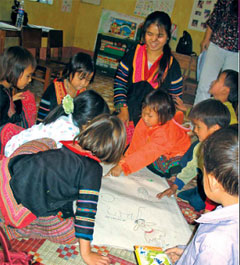Introducing multilingual teaching in Vietnam
Nguyen Thi Bich and Dinh Phuong Thao
Vietnam has 54 ethnic minority groups with different languages, making up about 13% of the population. Education enrolment and completion rates are lower for these groups, as are their performance results. This article outlines Save the Children UK’s (SC UK) work to promote increased use of mother tongue based multilingual teaching approaches, to give ethnic minority groups a better chance in education.
The situation in Vietnam
The majority group in Vietnam is the Vietnamese-speaking Kinh. Vietnamese is spoken as a first language by about 90% of the population. The constitution states that all ethnic groups have the right to use their own languages, yet the language of instruction in schools is Vietnamese, and only eight minority languages are taught as school subjects. Only 28 languages have writing systems, and few books exist outside the main minority languages, such as Tay, Muong, Cham, Khmer and H’mong.
There are few ethnic minority teachers, due to the difficulties they themselves face progressing through the education system. And in highland areas, where many ethnic minority groups live, children from several language groups are often present in one class, creating additional communication challenges for teachers, parents and children.
Vietnam’s overall primary enrolment rate is 94.5%, but the rate for ethnic minority children is just 80%. Completion rates in 2006 were 89.7% for Kinh but only 67.9% for children from ethnic minority groups. This gap is even bigger for lower secondary completion rates (76.5% for Kinh and 45.5% for ethnic minority children).
Most children excluded from lower secondary education are girls, especially H’mong girls. SC UK has evidence that drop-out rates for ethnic minority girls are also significantly higher than for boys from these groups.
Supporting education for minority groups
Between 2004 and 2006 SC UK tried to support minority children’s learning by selecting ethnic minority women and girls to be bilingual pre-school teachers. They worked in the children’s mother tongue and introduced them to Vietnamese. Fifty women were then supported to become fully recognised pre-school teachers. However, such mother tongue language support in pre-school is still not enough to help children cope with using Vietnamese in primary school.
Vietnamese is seen as the language of national unity, so reducing its use in education is a sensitive issue. Nevertheless, the government has responded to research linking ethnic minority children’s education difficulties with the unfamiliar language of instruction. It is now looking for practical ways to deliver primary education in multiple languages, testing locally relevant approaches to fit Vietnam’s situation.
SC UK has now developed a new phase of multi-lingual education in pre-schools and primary schools. The programme has been designed and implemented jointly by community members, teachers and local education officers, and Ministry of Education and Training (MoET) specialists.
Local languages will be introduced as languages of instruction as far as possible in pre-schools and primary schools. Vietnamese will be introduced more gradually as a second language, so that children can learn to use it without being overwhelmed.
Community teaching assistants
SC UK is again working with primary- and secondary-educated women in highland communities, building their skills as teaching assistants in pre-schools and primary schools. These ‘key mothers’ work with teachers to ensure that lesson content is relevant. They help adapt the curriculum and textbooks to the local reality, and support the use of active play and learning techniques. Key mothers introduce new teaching content to pupils in the local language. The teacher then introduces some key words in Vietnamese relating to that content. To prepare children for primary school, Vietnamese language is introduced verbally and children are familiarised with Vietnamese letters.
The main focus of the teaching assistants is on developing – in genuine partnership with teachers – active learning activities that will stimulate and improve children’s mother tongue and Vietnamese language skills. Teachers improve their local language skills through language courses and supported communication with local people. Where children from multiple language groups are in one school, classes are re-organised into multi-grade classes which contain just one language group. Teachers and teaching assistants are trained in multi-grade teaching.
Results of this approach
Children in the programme are showing much more engagement in class and greater familiarity with Vietnamese than children taught solely by a Kinh teacher. It is expected that children learning through this approach will progress more easily through school.
Education and donor officials are seeing the benefits of this multi-lingual team-teaching approach. As a result, ethnic minority teaching assistants have been recruited to another large aid project to improve primary education for ethnic minority communities.
Different initiatives on mother tongue based multi-lingual education are now being implemented in Vietnam by various organisations. It is expected that MoET will adapt these initiatives to develop a comprehensive approach to quality education for ethnic minority groups in Vietnam. Monitoring and evaluation of the various pilot initiatives will be essential for providing evidence to justify further investment in mother tongue based multi-lingual education.
Nguyen Thi Bich is Deputy Programme Director and Dinh Phuong Thao is Education Programmme Manager for SC UK in Vietnam. Contact:
Save the Children UK Vietnam Programme
218 Doi Can Street
Hanoi
Vietnam
Email: ntbich@scuk.org.vn
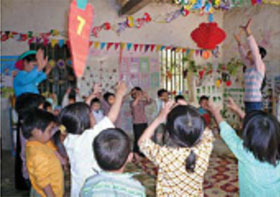 |
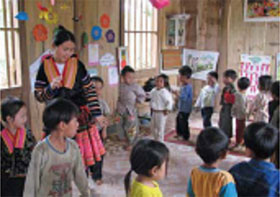 |
|
|
|
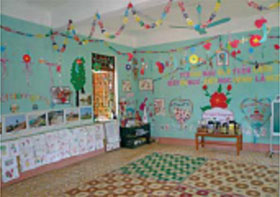 |
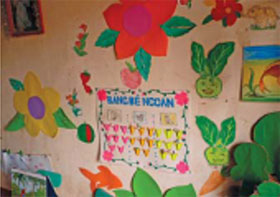 |
| Teaching and learning materials, and children’s work, displayed in a classroom | |
Photos by Save the Children UK, Vietnam
